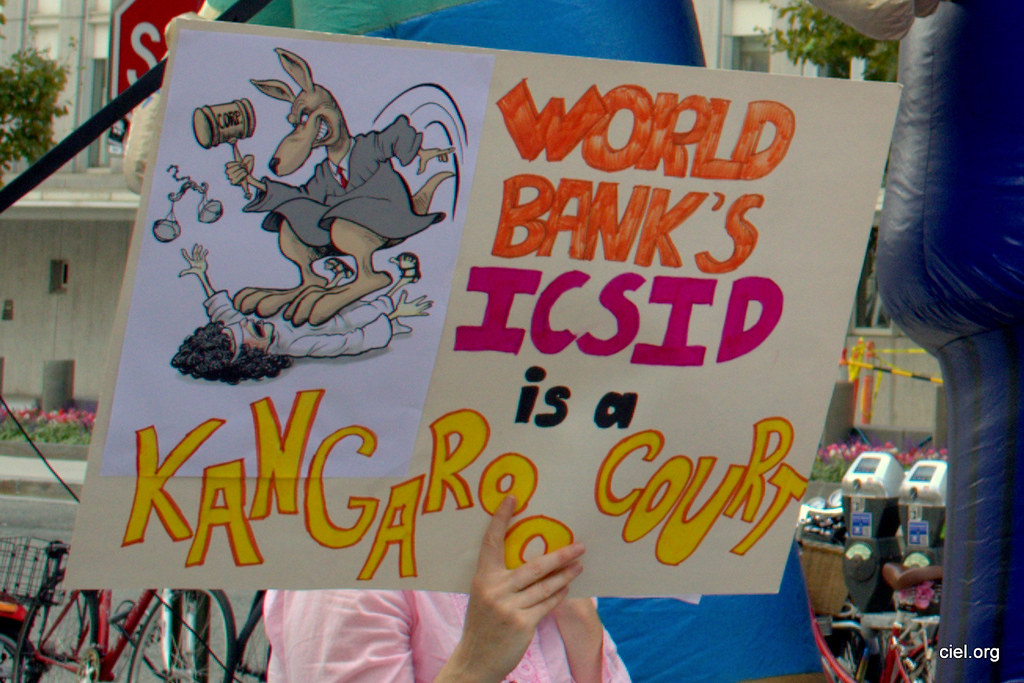Risks for Mexico in the renegotiation of its FTA with the European Union
All the versions of this article: [English] [Español]
TNI | 10 August 2021
Risks for Mexico in the renegotiation of its FTA with the European Union
by Manuel Pérez-Rocha
To end neoliberalism and defend energy resources, the present government of Andres Manuel López Obrador must step up and avoid at all costs the inclusion of supranational arbitration mechanisms in a renegotiated FTA with the European Union (EU-Mexico FTA), and ensure that European transnational corporations are made accountable for human rights violations in Mexico.
Since president Salinas de Gortari in the early nineties, Mexican governments have adopted a neoliberal approach to international trade and given away our legal sovereignty to transnational corporations by signing free trade agreements such as NAFTA (now the USMCA) and the Trans-Pacific Partnership (TPP). To end neoliberalism and defend energy resources, the present government of Andres Manuel López Obrador must step up and avoid at all costs the inclusion of supranational arbitration mechanisms in a renegotiated FTA with the European Union (EU-Mexico FTA), and ensure that European transnational corporations are made accountable for human rights violations in Mexico.
As discussed in “Unmasked: Corporate Rights in the Renewed Mexico-EU FTA”, several European companies have a long history of human rights and environmental violations in Mexico, such as Spain’s wind energy enterprise Union Fenosa in the Isthmus of Tehuantepec, or water grabbing companies like Aguas de Barcelona in the state of Coahuila. Recently, the human rights organization ProDESC published the report “Vigilance Switched Off” with European partners, documenting how France has turned a blind eye to Électricité de France (EDF) wind energy project–a company 83%-owned by the French state–and its widespread human rights violations of indigenous peoples in Unión Hidalgo.
“Modernizing” the EU-Mexico FTA falls short of addressing these serious deficiencies and is nothing but a euphemism for increasing investor rights. The main aim of the so-called “modernization” is the inclusion of a chapter on investment protection, with an investor-state dispute settlement mechanism (ISDS), which would overcome the fact that disputes until now could only be filed and settled under bilateral investment treaties – namely the ones signed by Mexico with 15 European countries.
It is worth noting that the EU-Mexico FTA has already brought negative consequences for Mexico in terms of trade. Per my own calculations based on data from the Ministry of Economy, Mexico’s trade deficit with the European Union reached an accumulated total of US$404,679 million since the FTA entered into force in 2000. A chapter on investment protection would potentially deepen the burden, increasing the danger of multi-million dollar awards adding up as a result of ISDS lawsuits against the State by companies from the oil, gas, energy and other sectors.
As the Transnational Institute has documented, the Investment Court System that the EU created and intends to impose on Mexico will accentuate the imbalance between binding rights for large corporations and merely voluntary guidelines on human rights (hard law vs soft law). The current Global Agreement contained in the EU-Mexico FTA includes a democratic clause that would have allowed the suspension of the accord due to recurrent human rights infringements. But for more than 20 years since the agreement’s implementation, these violations have been ignored by both the EU and Mexico, turning the democracy clause into a merely decorative feature. If Mexico and the EU are serious about modernizing their relationship, they should focus on correcting this imbalance that favors transnational corporations. They specifically should refrain from granting companies the right to resort to secret supranational tribunals which are primarily designed to benefit their interests and extend their privileges, such as the World Bank’s International Centre for Settlement of Investment Disputes (ICSID).
It is important to take into account that the USMCA (or NAFTA 2.0) “legacy clause” allows corporations to file suits against countries under NAFTA’s chapter 11 for three additional years after NAFTA’s termination, whereas “investment protection” between Mexico and the United States under USMCA will be restricted to public contracts signed by governments with companies in the energy, oil and gas, infrastructure and telecommunications sectors. This is why law firms like Baker McKenzie recommend that U.S. companies in other sectors use other international investment treaties to sue Mexico. A revamped pro-investor EU-Mexico FTA could well be their preferred instrument in the future.
This phenomenon of “treaty shopping” has been common place under the ISDS regime. Transnational corporations only need to open a postal address–The Netherlands being a paradise for these–to avoid taxes and hold all the necessary tools to sue a country with the investment treaty that best fits their purpose.
In addition to preventing foreign corporations from resorting to supranational tribunals, the Mexican government must exclude the “indirect expropriation” clause from the EU-Mexico FTA, which would grant companies the right to demand “compensation” for the loss of expected profits, even for investments that have not been made. In 2013 for example, Mexico was forced to pay US$40.3 million to Abengoa after that the municipality of Zimapán in the State of Hidalgo legitimately denied the Spanish company a license to establish a hazardous waste deposit, a little more than a mile away from a natural reserve and less than half a kilometer from the Hñahñü indigenous community.
To deal with all these risks and ensure human rights are fully protected and prevail over transnational corporations’ privileges–including economic, social, cultural and environmental rights–the government of AMLO must secure the broad participation of social sectors and affected communities in the renegotiation of the FTA with the EU. The time has come to put an end to the inertia and bias of previous governments negotiating behind people’s backs.
Manuel Pérez-Rocha is Associate Fellow at the Institute for Policy Studies in Washington D.C. and Associate of the Transnational Institute.
Twitter: @ManuelPerezIPS
Translation to English by Pierre-Yves Serinet






